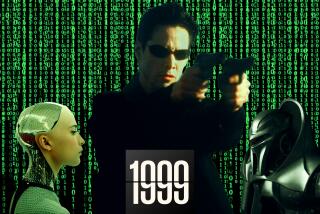Chips, Lacking the Design Flaws of Brains, Will Lift Minds From Here to Eternity
The movie âA.I. Artificial Intelligenceâ raises the wrong questions about our future with computers because it gets the technology wrong. It will be far easier to make us more like computers than to make computers more like us.
Chip implants will make that possible because chips have so many advantages over brains and robots. Brains are wet and have random wiring. They need sugar and oxygen and sleep. They risk stroke and need a special cooling system for their thick skull-based housing.
And they have a fatal design flaw: Brains have no backup. They forget old things as they learn new things. So memory steadily decays. A blood clot or a bump on the head can wipe out our most precious biological data. Evolution gave us not only a ramshackle computer made of three pounds of meat to house our minds; it gave us just one for life.
And what holds for tomatoes holds for brains: They are easier to grow than to build. Our best neural-network software still cannot recognize patterns as well as a fly can. That is a manageable problem because most researchers would rather produce sight than an eye. But the movieâs old pre-computer vision of robots is that we will build mobile mechanical people part by part. This is an almost prehistoric vision of an animated doll and it made far more sense in the era of silent films, when Fritz Lang explored it in the 1927 film âMetropolis.â
The key fact is that chips trump robots. Progress in robotics has been steady but linear while progress in chips has been exponential and will likely stay exponential for years and perhaps decades. The so-called Mooreâs Law of chips says that the number of logic circuits on a computer chip doubles every 18 to 24 months. So the real question is not whether robots will replace humans but whether chips will replace brains.
That question may raise many ethical issues, but the answer to it is surely yes. Today a chip would have to be the size of a large house to equal the sheer processing power of the human brain. But Mooreâs Law cuts the size of that house in two every 18 months or so. That means chips in 2020 or so will have the raw processing power of the human brain and will forever exceed it after that.
We already place chip implants in inner ears to improve hearing and in retinas to give limited sight to the blind. The FDA has approved brain implants to help reduce the tremors of Parkinsonâs disease. Better chips and better science will someday produce brain implants that will at first restore cognitive function in Alzheimerâs patients and then will boost it in anyone. That would make it a lot easier to learn Latin or calculus.
The distant but inevitable step is not just to back up the brain but to replace it outright. Then the music of the mind will play on a digital instrument with almost godlike powers. Such chip minds will have a bit-based omniscience because they could access all knowledge and all databases at the speed of light and never forget any of it. They could easily relive and edit and alter any past physical or emotional experience and do so with the same ârealâ intensity as when someoneâs flesh first experienced it.
Chip minds will have a bit-based omnipotence because they could create entire virtual worlds simply by imagining them. Letâs not forget that the world we see âout thereâ is but an illusion in the neural circuitry of our brainâs visual cortex.
Even our subjective sense of time will change. We find the second a meaningful unit of time because electrical signals travel so slowly through our nerves. Chip time, or ânanotime,â will be millions or even billions of times faster. One second of brain time will equal years or even decades of chip time. This will give chip minds a bit-based approximation of eternity. That also will mean a robot with a chip mind would find brain-based humans frozen as if they were clay models in a time-lapsed animation.
So forget âA.I.âsâ vision of lumbering machines that simply mimic our pre-computer notions of speech and movement and emotions. Brains and robots and even biology are not destiny. Chips are.






